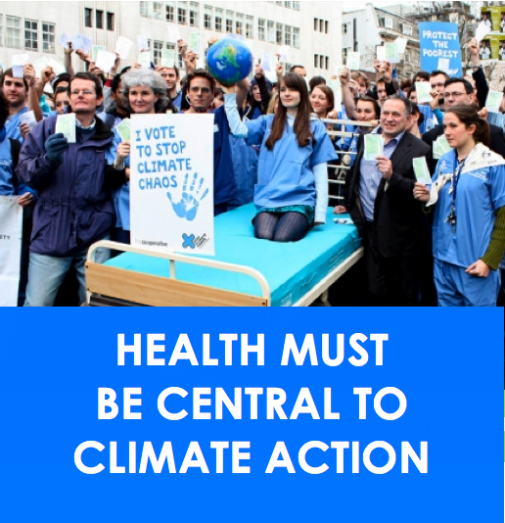Climate Talks and the Doha Declaration on Climate, Health and Wellbeing
Original blog post published 9 January 2013
Guest blog written by Isobel Braithwaite, Medical Student, UK
In order to protect and promote human health in the face of climate change, we will need creative, smart and rapid action: not only from our governments but also from us, as people who care about health.
As the national coordinator of Healthy Planet UK, I help to link up and support students from around the country who are passionate about tackling global environmental change to protect human health.
As future health professionals, our work focuses on the links between climate change and health because we believe it’s 'the biggest health threat of the 21st century' - and because a more sustainable world can be better for health.
As medical students, we are also acutely aware that we will be the ones to inherit health problems that, for now, seem far in the future. Urgent action is needed now to avoid the enormous health consequences of climate change.
Last year, our team went out to the Durban Climate Summit (COP17), where they made this video. This year, Jonny Elliott went to represent Healthy Planet at COP18 in Doha. It was an exciting and often frustrating fortnight of advocacy - engaging with young people from around the world, negotiators from Sub-Saharan Africa and small island states, which are particularly vulnerable to climate change, and members of the WHO team amongst others – and above all an eye-opening one.
COP18 delivered some wins - a second commitment period of the Kyoto Protocol; loss and damage was put on the agenda, albeit in vague terms; and gender made it into the spotlight. But overall, the outcomes are miles away from what the science tells us we need: emissions reductions pledges far below those required to avoid a 2°C rise, inadequate commitments on pre-2020 adaptation finance and barely a mention of health. Frustratingly, climate change is still seen only as a threat to ecosystems or the economy, rather than people's health.
With several other organisations, we were involved in putting together the Doha Declaration on Climate, Health and Wellbeing – now signed by over 80 organisations and more than 1300 individuals – sought to address this and was launched during the Summit.
The Declaration highlights the effects of climate change on current and future health, the cost to health of carbon and the immense health and economic ‘co-benefits’ of meaningful climate action. Most of the health impacts people know about are direct ones eg. vector-borne diseases, heatwaves or flooding - yet global predictions for future food availability may be wildly off because they don’t include the effect of extremes and food insecurity can have huge indirect impacts by forcing people to migrate, and driving civil conflict.
If you care about health, there is still time to add your signature to this critical declaration – it takes 30 seconds to sign up here.
Whilst the outcomes from Doha are bad news given the seriousness the situation, we would be in a worse position if the process had collapsed entirely. The UK Climate Change Secretary, Ed Davey, commented, 'we wanted to pave the way for the future [discussions on a new global treaty] and we've done that'. As Alden Meyer, head of the USA’s Union of Concerned Scientists put it recently, “we have lots of work ahead of us, both in our home countries and at the international level, if we expect to get better outcomes.” That will require courage, creativity and leadership, not only by our governments but also by us; young and old.
At Healthy Planet UK, and our umbrella organisation Medsin, we aim to educate, advocate and act to help fulfil his challenge; to play our role in shaping the world and the health systems that we will inherit.


